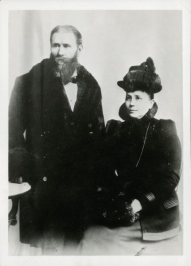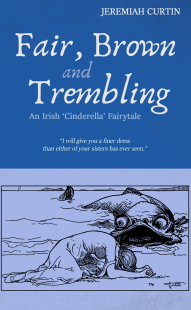JEREMIAH and ALMA CURTIN

Born to an Irish Catholic family and brought up on a farm in the wilds of Wisconsin, Jeremiah Curtin (1835-1906) was an American linguist, folklorist, and translator. The eldest of eight children, he sold his shares of the farm after his father died to finance his education at Harvard, where he learnt new languages at every opportunity and it was there he first studied folklore under the folklorist Francis James Child. When he graduated in 1863, he moved to New York City, read law, and worked for the U.S. Sanitary Commission while translating and teaching German.
Curtin then travelled to St. Petersburg in 1864, where he served as secretary to Cassius M. Clay, Minster to the Russian court. Curtin visited the Caucasus and studied Slavic languages. Upon his return to the U.S., Curtin lectured on Russia and the Caucasus. In 1872, he married Alma Cardell, whom he had met on a trip to Wisconsin. She acted as his secretary.
In 1883, he was employed by the Bureau of American Ethnology as a field researcher. His assignments—documenting customs and linguistic materials and gathering folktales and mythologies from many Native American tribes—took him to the Seneca and to various tribes in Oklahoma and to California and Oregon.
Curtin translated into English the works of the Nobel Prize-winning novelist, Henryk Sienkiewicz (1846-1916), including Quo Vadis. He and Alma travelled extensively. Together, they made several trips to Ireland, visited the Aran Islands, and, with the aid of interpreters, collected folklore in southwest Munster and other Gaelic-speaking regions. While Alma wrote with him, Curtin rarely gave her credit; as a result, all of their works are in his name.
Available Titles by Jeremiah Curtin:

